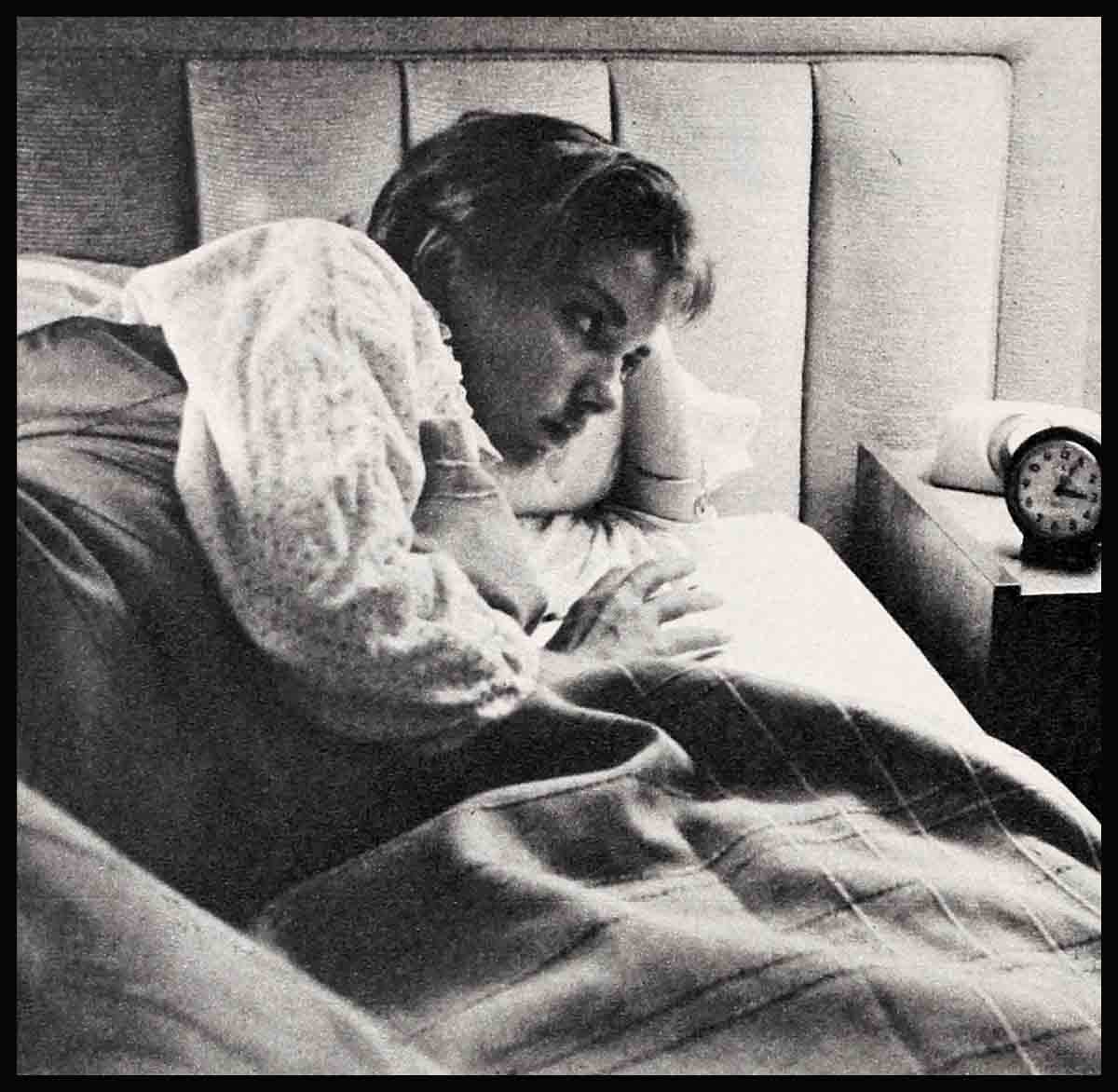
The Day A Star Was Born—Stephanie Griffin
I couldn’t sleep, and suddenly I gave up trying. I leaned over to the night table, switched on the light and lit a cigarette. People are always saying things like, “The hours crawled,” or, “I thought the time would never pass.” For the first time in my life, I knew what they meant. As a model, as a hardworking young actress, and as a temporary mother with two young sisters to raise I’d never found any day that held enough hours. But then, I’d never known fear before, either. Now I was afraid. Now I was asking questions that no one could answer. Questions like, “What would happen to me if I didn’t get the part of Valinda in ‘The Last Wagon’? Would ‘they’ give me another chance? Or would the word go around that Stephanie Griffin had muffed her test—muffed the biggest chance of her career—that she simply didn’t have it?”
I remembered the old Hollywood saying that, if you don’t get it right away in this town, the chances are you won’t get it at all. And I’d been in Hollywood for five years. For five years I’d waited and hoped and prayed for a chance like this and then, when I got it, what did I do? I goofed. But how did I know I’d goofed? Why didn’t they call? Why didn’t they call?
Suddenly, I couldn’t stand it any longer. I had to talk to someone. I lit another cigarette and looked over at my husband’s heavily—and happily—sleeping form. The sight made me furious. Why should David sleep so soundly when I was going through all this torment? I gave the covers a quick, angry jerk, thinking that might waken him. I should have known David better. He just slid more deeply into the covers.
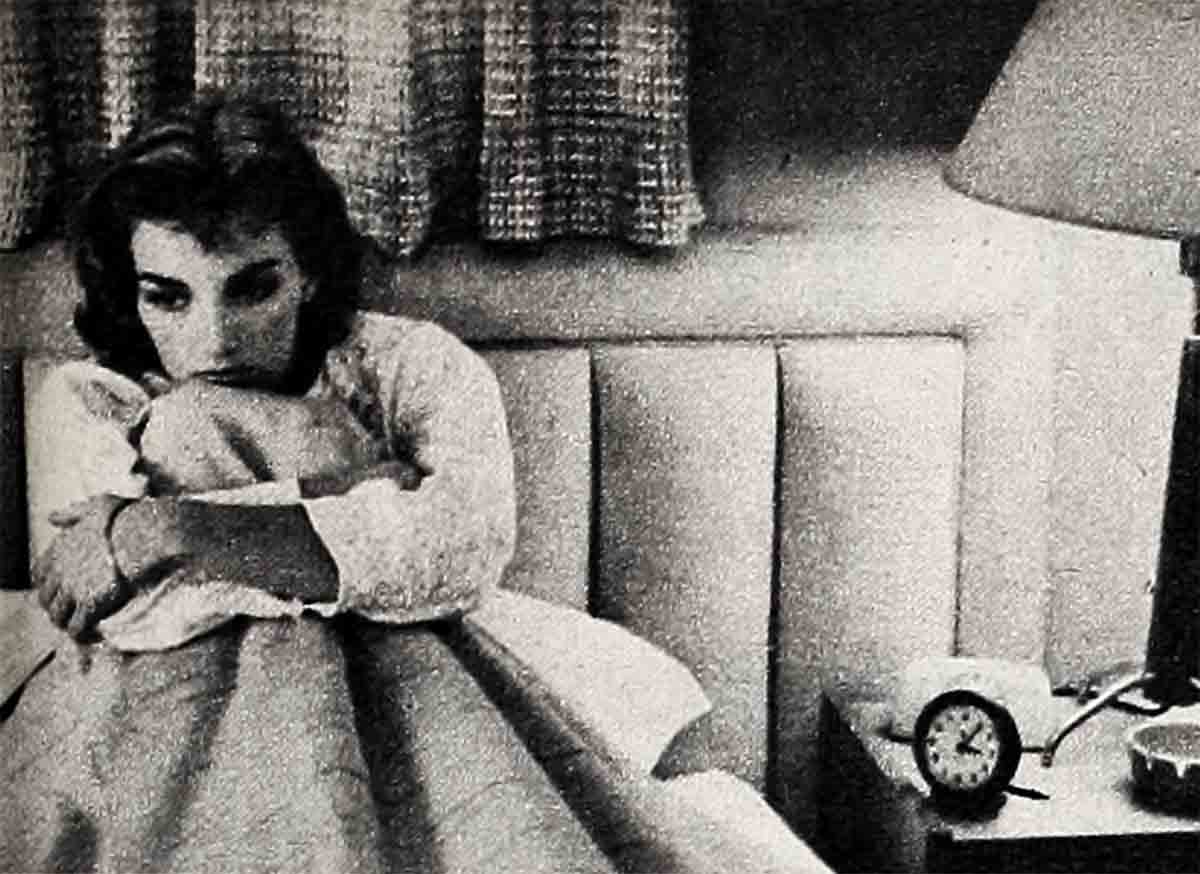
I stood there beside the bed, staring down at him. Glaring down at him. What a man, I thought grimly. What a husband! How could he do this to me? How could he be so indifferent to what I was going through? I almost hated him. I wanted him to wake up, to take me into his arms, to tell me that I’d done all right, that I had nothing to worry about, that the part was mine. It was true that David March was my manager, but it was also true that he was my husband. And tonight—this morning, rather—I wanted him to act like a husband.
The illuminated dial of the little black-and-gold onyx clock told me it was three-thirty. It also told me that unless I wanted to look like a wreck tomorrow, I’d better go back to bed and try to get some sleep. But I couldn’t sleep, and I hated anyone who could: I sat on the side of David’s bed debating how to waken him. I decided to be cute. I bent down and blew my breath in his face. His eyes opened, and he stared at me.
He looked from me to the clock and back to me again. He looked worried. “What’s the matter?” he asked. “Are you ill?”
“No, just worried. David,” I said quickly, “I’m sorry, but I just can’t sleep.”
Then he exploded. “You can’t sleep, so I’ve got to be awake, too! What is this? I need my sleep. I have an office to go to tomorrow. I have my own work to do. Sure, I’m your agent—but I’m your husband, too.”
“But that’s just it—” and even as I said it, I was hearing the words as though someone were reading them back to me and they sounded like a wail. A small, childish wail. I went stubbornly on with it, even while I watched the black March cloud descending. “I don’t care,” I said sounding even more childish. “You are my husband and I want you to act like one. I want you to care about what happens to me.”

He sat bolt upright then and he talked very quietly, the way David always talks when he’s really angry. “Do you know what you sound like right now, Stevie? You sound like a sullen and disappointed child. No one cares more about what happens to you than I do. I’m your husband, agent, manager, lover, all in one. Now,” he said, “go back to bed and try to get some sleep.” Then he relented and put his arms about me. “If this is an example of how you’re going to carry on every time you’re up for a part, honey, this house won’t be known as the March house, it will be known as the nut house.”
That relieved the tension between us. He reached over and snapped off the light and in a minute he was asleep again. I went downstairs and poured myself a glass of milk, then carried it into the living room and sat on the couch. All the lights were out and the room was dark except for the silvery beam of moonlight that lay across the floor at my feet. It reminded me, somehow, of my childhood, of the times when I’d wished on the new moon, or on a star. I thought of the day I fell in love with David and of the nights when I would lie awake, thinking about him, wondering if he’d ask me to marry him and wondering how I’d go on living if he didn’t. Had anyone said to me then, “Which means more to you—your career, or David?” I guess I just would have stared, wondering how anyone could ask such a silly question, and I would have said, “Why, David, of course. What good is anything without someone you love to share it with?”
Yet here I was, with the last of the moonlight spilling through the windows before that early morning blackness that would precede the dawn—here I was telling myself that nothing mattered except that part, that if I didn’t get it I was through, licked. Slowly, on tiptoe, the past crept into the silent, darkened room and sat beside me to keep me company.
I thought of the early years in Valley City, Ohio . . . and of how wonderful Aunt Edith and Uncle Harry had been to me. Poor Aunt Edith. Seeing my need, she gave me love without reservation, and I absorbed it like a blotter. But in so many ways I was a little brat. Yet I grew. Before that I had lived with my father in Nevada, my mother in Hollywood. They were separated, and we children suffered for it. We were never together as a family. When I was with Mother in California, my little sisters were in Ohio; when I went back to the farm there, Pat and Mikey came out to live with Mother.
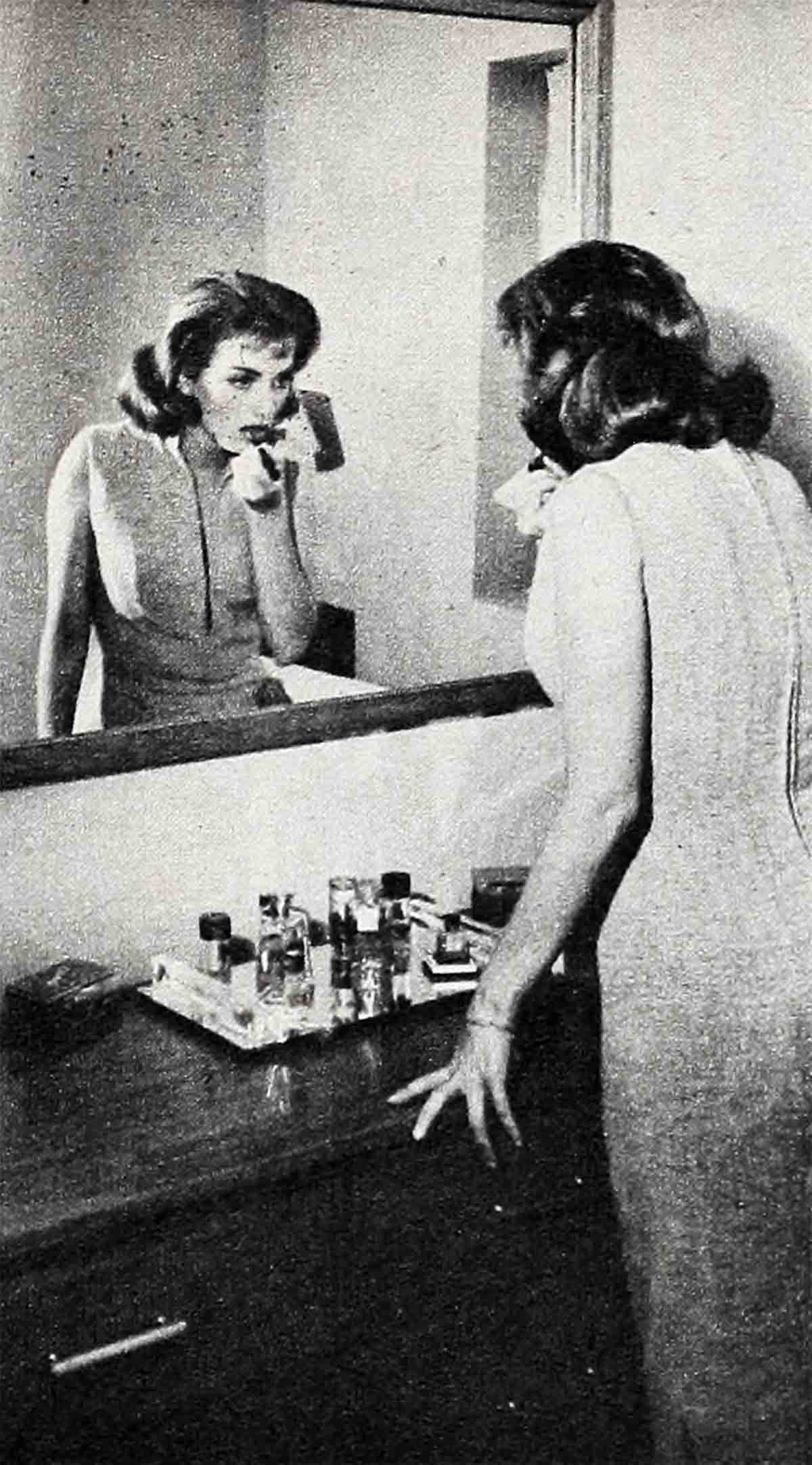
But in Ohio was peace, the beautiful, rolling farm with its brick house and tall white fence. There were other children, ice-skating, tobogganing. I grew, inwardly as well as physically. And there I won the Shakespeare contest for my acting in “Romeo and Juliet.” That moment was the beginning of the dreams of stardom that had brought me here to this hour, to this night, face to face with the future.
What price would I pay if I got the part? What would happen to my life if I didn’t? I tried to comfort myself with the thought that if it was God’s will that I get it, then everything would work out. Success would have its good parts. I would be able to do things for my two sisters, Michalene and Patra, both out of my love and out of a deep sense of obligation. Michalene, or Mikey, the elder of the two, still lives with us. Patra, or Pat, is happily married. They have both known more than their share of rough times, and if God was going to grant me the opportunity and the guidance, I would do everything in the world for them. It was a promise I made that night, a sort of forfeit to fate.
When I walked back to the bedroom, I glanced at the clock. It was now 4:45 A.M. I felt much calmer. I was full of remorse for having wakened David. As I stood looking down at him, wondering guiltily how he was able to put up with me, I felt a new surge of love for him. I realized I wouldn’t know what to do without him. I bent down and kissed him good night, crept into bed and tried to fall asleep. I didn’t know that I had succeeded until I rubbed my eyes and saw that it was 9:30 in the morning. David had already left for the office. Maybe by now he had heard something, there had been some decision. I dialed his number, my hands shaking. “Have you heard anything?” I gasped out the words.
“Not yet,’ David’s patient voice came over the wire. “Now look, honey, stop jittering so much. No matter what happens, everything will turn out for the best. If you’re supposed to get the part, you’ll get it. Now relax and leave it to the Man Upstairs.”
It made sense, but I didn’t want sense. I wanted facts. I asked, “Why don’t they call? Why don’t they let me know one way or the other?”
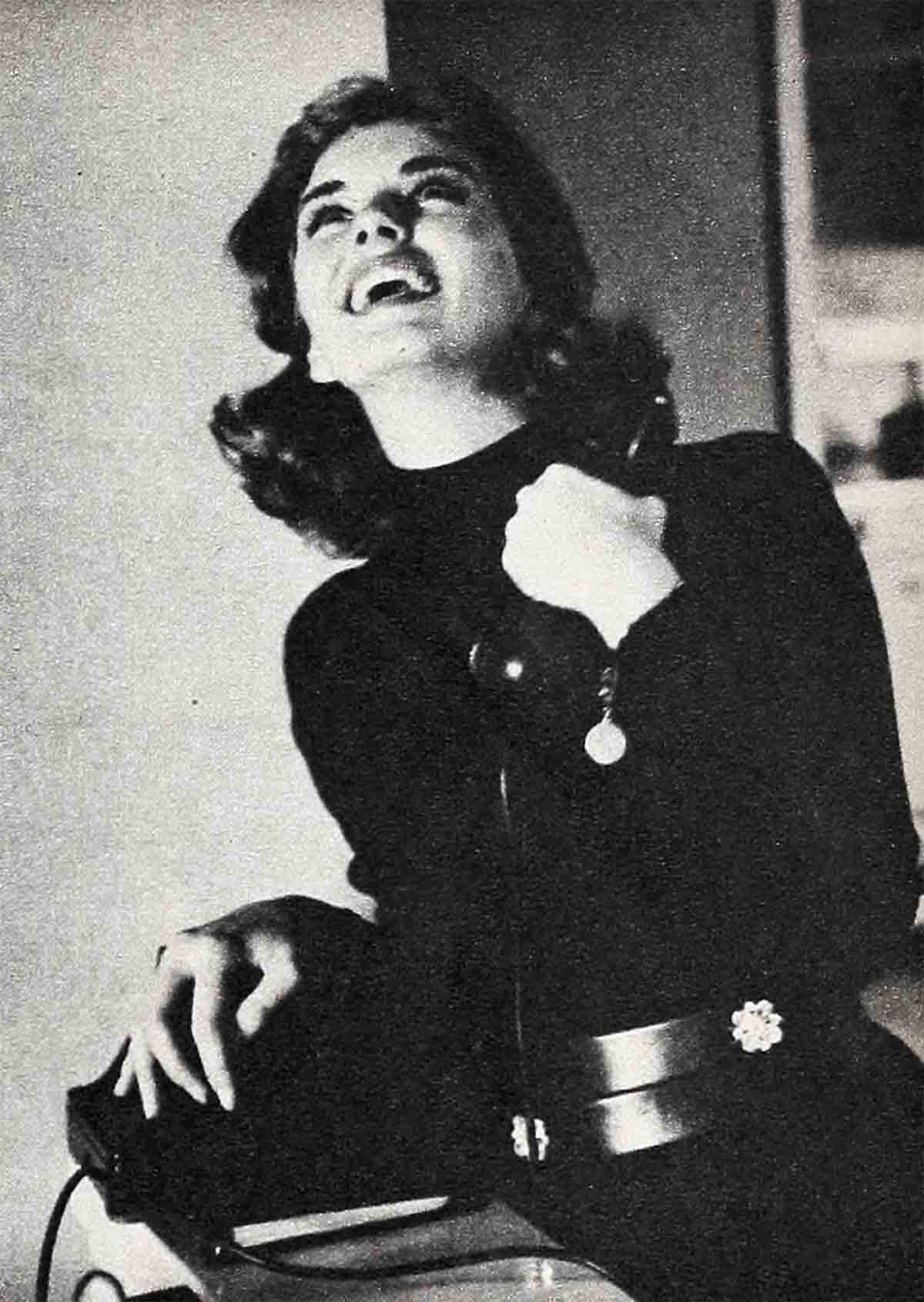
“Look,” he said again, this time more impatiently, “I have news for you. You’re not the only actress in town. In fact, you’re not even the only actress on my list.” His voice softened, and I could just see him grinning: “So don’t call me, I’ll call you.”
I heard the receiver click. I hated him all over again. I hated myself. I had failed.
I turned away from the phone and wandered around the house. I tried eating some breakfast, but I wasn’t hungry. I put the radio on and switched it off again. I wished that Mikey had not gone to school. I would have someone to talk to. Mikey was always a wonderful audience for me. I decided to talk to David again. After all, what right had he, my husband, to tell me not to call him?
I picked up the phone and put it down again. “Now what? Now what? Now what?” The words went through my mind like a swarm of angry bees. The next words were: “You didn’t get it, that’s all. Face it. Decide what to do next.”
The phone rang. I stared at it, hating it. Why answer it? It wouldn’t tell me anything I wanted to know. But maybe—just maybe. . . . Gingerly, I picked it up. I breathed out a small, tentative, “Hello?”
Nick Adams, the young actor with whom I’d tested, said, “Heard anything?”
He tried to keep his voice light, almost gay. But the desperation showed through, just as it did in mine when I said, “Not yet. But, after all, it’s early.”
Nick said, “Yeah. But, kid, I’ve got news for you. For us, it’s late. Well,” he said, “good luck, kid.”
I said, “You, too.”
Slowly, reluctantly I hung up. Nick had been someone to talk to, someone who understood what we were both going through. Then I was alone again.
I found myself remembering more of David’s philosophy. “In this business, Stevie, you’ve got to be a machine. If a good part comes along and you get it, you become well oiled in feeling and temperament. If a part does not come along, or if you don’t do well in a role, you become stagnant, rusty, disheartened.”
I’d seen people like that in this town, plenty of them. People with looks, with talent, but who had, somehow, just never gotten the breaks. I’d seen them sitting beside the dime-sized swimming pools of cheap apartment houses, waiting for a phone that never rang, hoping, pretending, believing.
Was I going to join them? Was I going to be one of the girls who said, “Oh, I decided the part wasn’t big enough for me”? Then I thought, realizing it all at once, “I can say I didn’t want a career, after all, that marriage was all the career I wanted.” Just then the door opened. David was home.
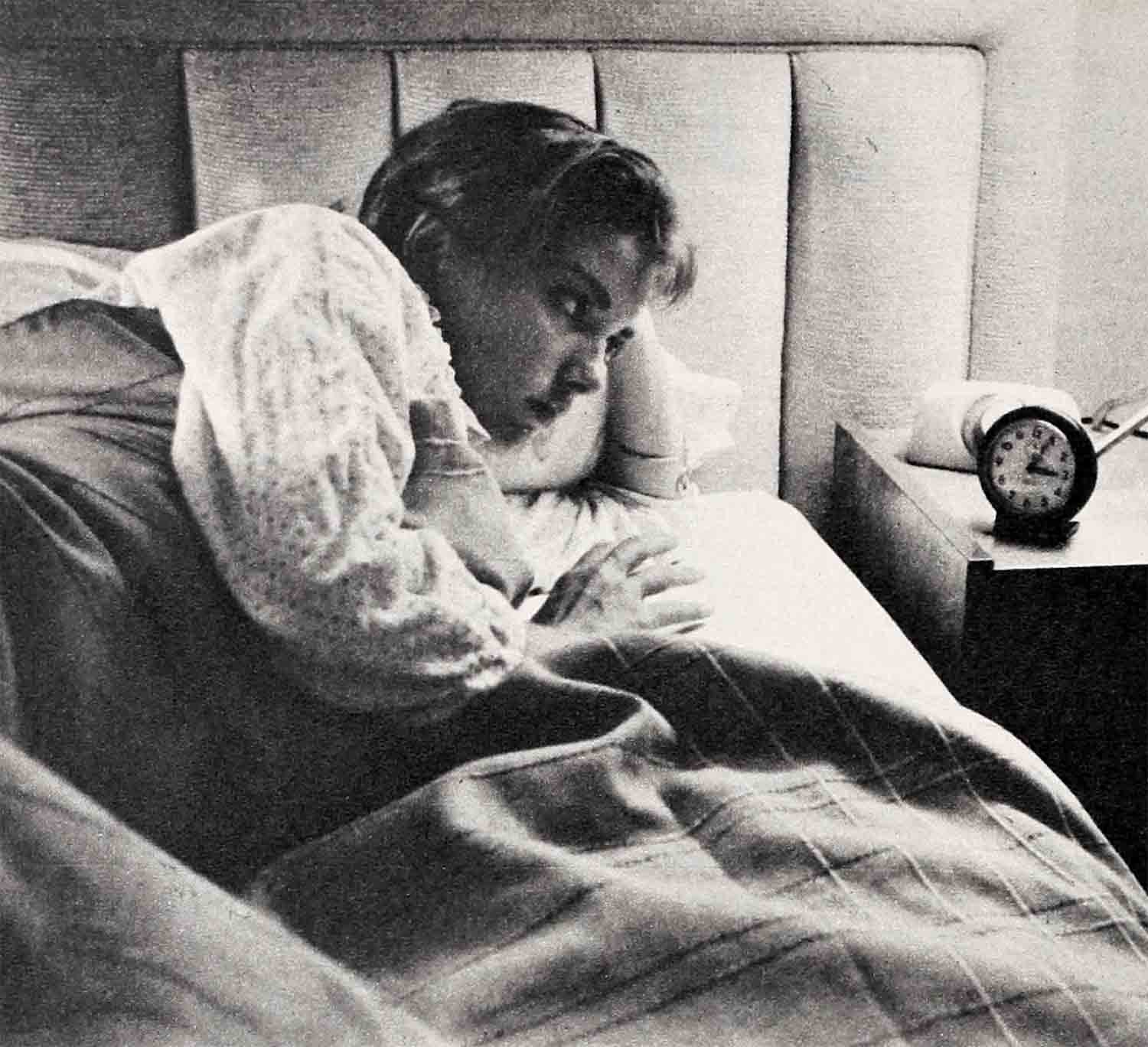
I went flying into his arms. “It’s been the longest day, David! And they didn’t call! They didn’t call!”
David said calmly, “Have you eaten?”
“Of course not. How could I?”
Wordlessly, he marched me over to the | kitchen table and sat me down. It was two o’clock in the afternoon. But for all his outward calm and nonchalance, I knew he was getting as nervous, as uneasy, as I was. He was worried for me. He was afraid for me. I could see it in the way he fixed the bacon and eggs. David is a wonderful cook, but today he was breaking the eggs, burning his fingers on the handle of the coffeepot, forgetting the toast until it was burned.
“It’s all right,” I said. “I’m not very hungry. Let’s stop talking about me and talk about you. What did you do today?”
I guess husbands and wives all over the country sit in kitchens like ours and ask one another that question. The only thing that’s different about it when you ask it in Hollywood is that out here you’re not just applying for a job as secretary or sales clerk or something like that. It’s not a matter of, if you lose your job you can pick up another. Out here, there’s something that tells you this is your big chance. If you muff it, you’re through.
Well, I tried to tell myself as I choked down the bacon and eggs I didn’t want, so what? You did your best. You’re still a person, a human being. You’re still Stephanie Griffin. You’re the girl David wants to find on the other side of the door when he opens it. You’re the older sister Mikey wants to come home to, pouring out her thoughts and her struggles and her dreams. If you can’t live for yourself any more, you have those people to live for. You’re lucky, Stephanie Griffin, I found myself thinking all at once. You might fail as a star, but it’s up to you to succeed as a person. As David’s wife, as Mikey’s sister.
It’s funny what thinking that did for me. I’ll never forget it. It was the second really big moment in my life. First, that time when I won the Shakespeare prize and knew I wanted, more than anything else, to be an actress. Then this moment of sitting here, listening to David and not really hearing him, knowing that I wanted, more than anything, to be a person. I’m not sure, but I think I said a little prayer, then. I left David, and I left our sunny kitchen, and I left the blue canopy of sky outside our window and I was alone for that minute that it took me to say to Someone, “Never mind all the rest of it—though thanks a lot for trying. The only thing I want now is to have You help me to be the sort of person who will never again think that what happens to me is the most important thing in the world.”
“Stevie!” It was David’s worried voice, his worried face bending over me. “Stevie, you look ill. Are you all right?”
“What?” I said. And then I said, “Yes—oh, yes, I’m fine. I was just thinking about something. David,” I said quickly, “I’ve been wanting to tell you how sorry I was about waking you up this morning. That was selfish of me. Forgive me?”
“You know,” my husband said thoughtfully, “sometimes I think you’re even more of a screwball than you are. This morning you’re in the dumps and now, with nothing happening, you’re suddenly walking on air. Forgive you?” he said. “What do I have to forgive you for? Don’t I love you?” But as he was ready to leave the house to go back to his office he paused at the door and looked at me again. “Look,” he said, “don’t worry about it. Remember, if it’s supposed to happen, it will happen.”
For the first time in all the years I’d heard David say those words I knew he was right. I wanted the part just as much, but I knew that all at once I was free of the worst thing in the world—fear. I cleared the table and looked at the clock. I wasn’t thinking about the phone ringing now, I was thinking that it was almost time for Mikey to come home and I didn’t want her to find me looking so haggard and worried. I went upstairs and washed my face and put on fresh lipstick.
At first, I thought I was hearing things. I listened again. It was the telephone.
My voice was so calm that David said, “Oh, then you’ve heard.”
“Don’t be silly—of course I haven’t heard. What is it, David? It’s all right if it’s bad news.”
“I don’t know what kind of news it is. But Billy Gordon of 20th called and wants to see me right away. One way or the other, baby, this is it. I’ll call you as soon as I know.”
I waited by the phone as the hands of the clock moved from two to two-thirty, to two-forty. I wasn’t afraid any longer, but I wasn’t calm, either. I knew that one way or another, I was approaching the third most important moment in my life.
When the phone started to ring again I sat there, watching it, listening to it, thinking of the thousands of other girls who had, at one time or another, sat watching a ringing telephone, knowing that when they reached for it their life would be changed forever. Then I lifted the receiver to hear David say, “Why don’t you answer your phone, for Pete’s sake? Kid, you’ve got it! You’ve got it! They said your test was magnificent, that this is the part that will make you a star. A star.”
The rest didn’t matter. The rest was names—a Mr. Schriber and a Mr. Adler. I would have to pass their approval. I said “yes” and “no” and whatever I thought I should say. None of it was making sense. It was all too much, all too wonderful. I didn’t know Mikey had come home until her voice, small and frightened, reached me. “Stevie,” she said, “it’s all right. What if you didn’t get the part? Heck, you’ll get another part, and meanwhile—”
Then I turned around and she saw that the tears that were streaming down my cheeks were tears of happiness. “Mikey,” I said, “Mikey, darling, I got it!” And then I said, remembering the promise I’d made, “Darling, from here on in, for us, for you—it’s going to be Christmas every day of the year.” And then I said, “You know, Mikey, God is good. God is very good, in fact.”
When David met me at the gates of the studio that afternoon, he just held open his arms to me and kissed me very lightly and very tenderly. Then he said, with David’s funny, crooked smile, “Honey, didn’t I tell you just to leave it to the Man Upstairs?”
He took my hand in his and together we walked toward the long, low white buildings of 20th Century-Fox. I saw Nick Adams there, sitting on the grass, waiting for me. He waved and came running to meet me. So did the world. With all it had to offer, and all that I would pay for these enormous gifts of fame and, perhaps, wealth, and stardom.
And for me, Stephanie Griffin, age twenty-two, that was the day a star was born.
THE END
It is a quote. PHOTOPLAY MAGAZINE DECEMBER 1956




